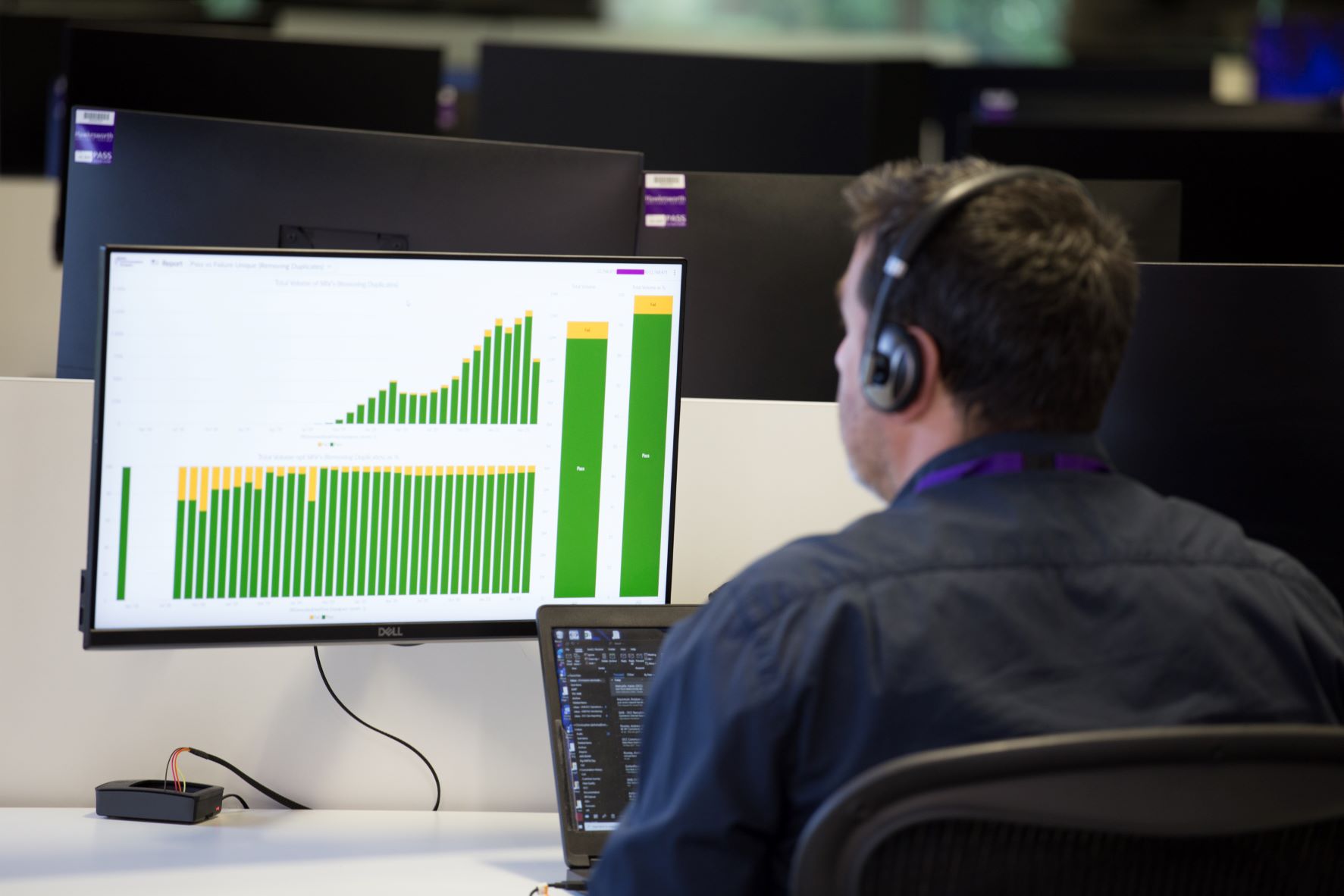Evolution
We like developing ways of making life easier
Part of building a smart energy future for people, is building the technology that makes it possible. So, with help from our customers and partners, we’re working hard to improve our network today, so we can lay the foundations for the energy infrastructure of tomorrow.

Programmes and key initiatives
What we're working on
Explore the programmes and key initiatives we're working on with estimated delivery dates
Ongoing programmes
In-life maintenance
A programme of maintenance and refresh to key architecture components to ensure security and stability of the network
The DCC architecture has been in operation for over seven years, its scale and complexity has grown significantly, and some key components are now approaching end of vendor support. DCC needs to maintain and refresh its key architecture components so that the agreed levels of service and security are provided.
The successful delivery of the In-life maintenance programme will support continuity of the DCC service for our industry users and their consumers, while minimising any risks to the security or performance of the network as experienced by our customers. This will be achieved through effective scheduling and coordination of in-life maintenance work.
Smart Energy Code (SEC) and Retail Energy Code (REC) – In-Life Change
The DCC operates under two industry codes – the Smart Energy Code (SEC) and Retail Energy Code (REC). These govern the end-to-end management of smart metering and the operation of the retail market respectively.
Our In-Life Change (ILC) team focuses on delivering high volume low-cost change, in a repeatable, controllable, and scalable way. Our experience of delivering SMETS2 SEC change is now being leveraged more widely.
The objective of the ILC team is to deliver technical system changes as requested and approved by SEC and REC parties. Our approach focuses on learning the lessons from previous releases, allowing these parties to realise the full benefits of their respective changes.
SEC and REC Modifications are industry-wide requests for changes to our services and we are required to deliver two SEC System Releases and two REC System Releases each year in June and November. Following the successful go-live of the Central Switching Service we delivered the first SEC release in June 2023.
Project management methodology
Following feedback from our customers and the findings of an independent assessment of DCC’s programme delivery capabilities, DCC intends to adopt PRINCE2 as our standard project management method.
This is designed to support our lifecycle management approach, notably the Concept to Contract and Contract to Market stages, with an internationally recognised, process-based method helping to ensure we deliver right first time and operate as efficiently as possible. In addition, the adoption of PRINCE2 will support a common language across our customer and supplier base, reducing unnecessary misalignment, while also helping to attract and retain staff through the support of internationally recognised certifications. Combined we believe this will help us to deliver an improved experience for both our customers and our people.
To be completed in 2024
Enduring Change of Supplier (ECoS)
Programme to enhance the security when customers are switching from one energy supplier to another
Ensuring that consumers can change energy supplier securely is one of the primary purposes of the smart metering roll-out. An essential part of this is the change of the security certificates on smart devices (primarily meters) that identify the responsible supplier. This is achieved through the ECoS programme. In August 2019, the DCC was mandated by the Department to deliver an ECoS solution and the corresponding Service Provider procurement process was concluded in 2021.
At the end of June 2023, ECoS successfully gained approval to proceed to go-live from the SEC Panel and DESNZ. This has enabled the migration of TCoS to ECoS devices to commence, with the migration expected to complete in Q2 2024.
SMETS 1 Enrolment and Adoption
Enabling the migration of more than 15 million first generation SMETS1 smart meters onto the DCC network
This programme is enabling the migration of millions of first generation SMETS1 smart meters onto the DCC network where they will become fully interoperable between energy suppliers. This will allow consumers to switch energy suppliers seamlessly without losing smart functionality and will also deliver significant savings to the industry through the consolidation of commercial contracts. The objective is to support competition in the retail market and allow consumers to enjoy the full benefits of products and services which depend on smart metering. Migration extends the operating life of first-generation metering assets, contributing to reduced waste in electronic goods and improved sustainability. It also reduces costs to customers from a swap out programme.
Great Britain Companion Specification (GBCS)
DCC is making sure all operational communications hubs are in line with the updated GBCS
The GBCS sets out data security and other operational standards for communications hubs. Government continually reviews GBCS standards to ensure that data security is maintained in line with new and emerging threats.
The DCC is mandated by the Department to develop, test, and deploy new firmware (FW) to all operational communications hubs in line with each update of GBCS. This is important because these changes ensure that the communications between smart metering devices in consumers’ premises and DCC are effective and enables continuity of the service. Furthermore, the changes include Issue Resolution Proposals (IRPs) which are requirements to fix problems identified by SEC parties with communications hubs.
Network Traffic Management (NTM)
Support the management of the increasing demand on service request volumes over the coming years
Service request volumes (SRVs) are forecast to increase materially over the next six years, driven by the growing number of installed and migrated meters; more SEC parties requesting metering data; SEC parties being given access to metering data by consumers; improved services such as the Central Switching Service; and new SEC Modifications. All this will create a large increase in system demand. The changes proposed in the Network Traffic Management (NTM) Programme are designed to address this issue.
To help support the management of this demand, changes are needed in the way traffic is managed across the network both between the DSP and Users (Gamma links), and between the DSP and the Communications Hubs (the Smart Metering Wide Area Network). It is DCC’s intention to utilise the existing capacity of the network wherever possible and avoid the incremental cost associated with increasing capacity of the network.
Business Accuracy Programme
Delivering cost efficient processes and driving value across the DCC’s operations
The scope of DCC’s work has grown significantly over the past several years. The volume of activity we are now being asked to undertake by the government and the industry is at its highest since DCC was established. We have quadrupled the amount of programme activity and we are managing a growing installed smart meter base.
As a result, the Business Accuracy Programme was established in 2022, with implementation spanning across 2023. The programme ensures that DCC has a core set of processes, systems and data which can support this level of complexity and provide integrated business plans and performance reports to track progress.
Test Automation Framework (TAF)
Achieve faster and lower-cost testing with additional enhancements that will allow DCC to confirm the efficiency of change
The Test Automation Framework (TAF) programme will support DCC’s commitment to increase the speed of Regression and User Integration Testing (UIT) and so deliver cost savings, while increasing test scope and device model combination coverage. This will be achieved through utilising enhanced, automated testing capabilities, which will provide greater value for money when testing SEC releases, maintenance releases and firmware releases.
Cloud Blueprint
The DCC infrastructure footprint has increased significantly over the last few years and comprises a mix of private hosting and private cloud, with greater adoption and use of public cloud services. The DCC Technology Function is preparing a strategy roadmap which presents DCC with the opportunity to cultivate a secure infrastructure estate designed to deliver improved infrastructure use while improving security, operations, compliance, and system governance. This will also ensure the delivery of improved business outcomes and solution availability, resilience, and scalability. The business accuracy through a service framework will create a more competitive, and more cost-efficient infrastructure estate, following best practice and public sector policy.
These opportunities build momentum towards a structured infrastructure-agnostic cloud strategy aligned to critical national infrastructure best practice. As the DCC network scales, adopting the right capability now will allow these opportunities to be leveraged more fully, more quickly, and at lower transformational cost and risk.
To be completed in 2025
4G Communications Hubs and Networks (CH&N)
Design and procurement of next generation communications hubs and networks
The current Customer Service Provider 2G and 3G Wide Area Network (CSP 2/3G WAN) contract for the Central and South region expires in 2028 with an option to extend until 2033. Furthermore, 3G sunsetting in the UK has already started with the technology now largely replaced with 4G. Whilst our 3G network will remain available for use until 2033, it is essential that we prepare to migrate from 2G/3G to a 4G network. As a result, the 4G Communications Hubs & Networks Programme has procured a new long-term 4G connected communications hub service that will provide secure, flexible connectivity and replace current 2G and 3G services.
The programme will ensure that the DCC continues to meet the needs of our customers in the medium and long term, using a flexible commercial model that supports effective change and drives value for money. The CH&N Programme aims to deliver the following outcomes:
- Ongoing secure connectivity, capacity, and longevity of devices as cellular technology advances
- Protection of investments already made and promotion of future value for money for customers
- Flexibility to allow ongoing change to support industry evolution
PKI Enduring Services (PKI-E)
Provides cryptographic services to the smart metering infrastructure to ensure security
The Trusted Service Provider (TSP) Public Key Infrastructures (PKIs) provided by BT, provides cryptographic services to the smart metering infrastructure. TSP is currently running a “tactical” solution that was deployed during September 2022 and will run until April 2025 with the option to extend a further year to 2026. The PKI-E (PKI Enduring) Programme has been launched to ensure that at that point a “strategic” solution will be available to take over on an enduring basis. PKI-E will also rationalise the approach to the major PKIs operated by DCC, according to the direction set by the DCC Strategy.
The new solution will be delivered with minimal impacts to our customers and DCC’s live services and programmes, whilst rationalising the PKI ecosystem and providing uniformity to the management layer of the PKI services where possible.
In establishing the programme, the DCC will mitigate the end-of-life risk but will also develop an enduring public key infrastructure platform that will provide the required levels of security, flexibility, and cost-efficiency to support both core services and future enhanced DCC capabilities. The new services will be designed to respond to emerging security needs over a ten-to-fifteen-year time horizon.
CSP.N Scaling and Optimisation
Identify, address and mitigate risk of capacity shortfalls in the North region
The CSP.N Scaling & Optimisation project is part of the Continuity of Service (CoS) initiative which has been established to ensure that the smart metering network has the capacity to support the full scheduled roll-out and the ongoing operation of smart meters. The CSP.N Scaling & Optimisation project is focussed on the North Region, identifying and addressing the gaps between the original contracted design and the current and known future requirements which have evolved materially over time.
The project is currently mitigating the risk of capacity shortfalls (as the installed based continues to grow) in the near-term by increasing the number of RF Channels used across the network. In addition, the project will deliver a medium-long term development roadmap for the Arqiva Network in the North Region, along with a supporting business case.
To be completed in 2026
Market-wide Half-Hourly Settlement (MHHS)
Capturing and transmitting half-hourly data
Electricity settlements and trading works using half-hourly interval data today. However, most domestic and smaller non-domestic meter points are settled on a non-half hourly basis. MHHS will mandate energy suppliers to settle all consumers with capable meters on a half-hourly basis. This opportunity has only been made possible by the roll-out of smart meters which can capture half-hourly data and transmit it back to the supplier.
Through MHHS, energy suppliers will be exposed to the exact half-hourly costs of customer consumption patterns, rather than this being estimated, as it is today. This will encourage electricity suppliers to offer time-of-use tariffs, which in turn will incentivise customers to shift their consumption to times when energy is cheap or to support protecting the electricity networks. New and innovative tariff options will help to increase competition for the benefit of consumers and support the government’s ambitions for decarbonisation.
DCC Service Management Systems (DSMS)
Replacement IT Service Management System by procuring a new Service Management System
This programme will provide a replacement IT Service Management System (ITSM) and ensure continuity of our Service Management capabilities when the current system ends its service life. Whilst rolling out this capability, we will simplify the ITSM landscape and make use of new technology – enabling efficient change and automation to improve operational efficiency and provide a better overall customer experience.
To be completed in 2027
Data Service Provider (DSP) Data Systems
Design and procurement of a data services platform to ensure continuity of service
The present DSP contract sets out the delivery of several systems and services that sit at the core of our smart metering infrastructure. These data services connect DCC Users (DNOs, energy suppliers and others) to devices at their consumers’ premises. This flow of messages between consumer premises and DCC users enables critical functions to take place such as prepayment meter top-up and allows for the collection of data needed in energy supplier billing/settlement or for other industry-wide innovative purposes.
The DSP Data Systems Programme will ensure continuity of service beyond the lifetime of the existing contract, which is due to expire on 31 October 2024. We need to ensure any change is managed in a way that minimises risk to continuity of the service and the security of smart metering.
- Featured

How are we doing?
We're passionate about improving the performance of the smart meter network for our customers. We have high standards and you can see how we're meeting them through a more detailed set of dashboards showing key aspects of the network's operational performance.
Read moreConnecting Britain
How the DCC network works
From meter reading and encryption to switching and billing, watch our video to find out how the DCC network makes it possible.
Further reading



